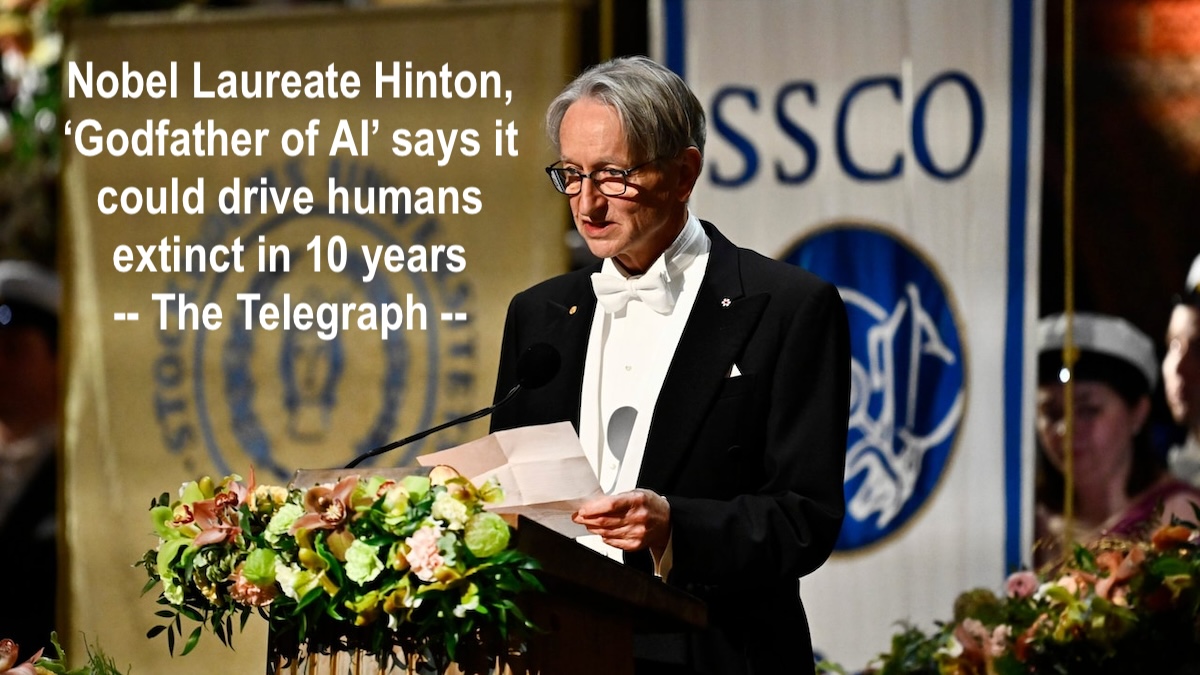‘Godfather of AI’ says it could drive humans extinct in 10 years – The Telegraph
by Tom McArdle
27 December 2024 12:13pm GMT
Prof Geoffrey Hinton says the technology is developing faster than he expected and needs government regulation
Artificial intelligence could wipe out the human race within the next decade, the “Godfather of AI” has warned.
Prof Geoffrey Hinton, who has admitted regrets about his part in creating the technology, likened its rapid development to the industrial revolution – but warned the machines could “take control” this time.
The 77-year-old British computer scientist, who was awarded the Nobel Prize for Physics this year, called for tighter government regulation of AI firms.
Prof Hinton has previously predicted there was a 10 per cent chance AI could lead to the downfall of humankind within three decades.
Asked on BBC Radio 4’s Today programme if anything had changed his analysis, he said: “Not really. I think 10 to 20 [years], if anything. We’ve never had to deal with things more intelligent than ourselves before.
“And how many examples do you know of a more intelligent thing being controlled by a less intelligent thing? There are very few examples.”
In the 1980s, Prof Hinton invented a method that can autonomously find properties in data and identify specific elements in pictures, which was foundational to modern AI.
He said the technology had developed “much faster” than he expected and could make humans the equivalents of “three-year-olds” and AI “the grown-ups”.
“I think it’s like the industrial revolution,” he continued. “In the industrial revolution, human strength [became less relevant] because machines were just stronger – if you wanted to dig a ditch, you dug it with a machine.
“What we’ve got now is something that’s replacing human intelligence. And just ordinary human intelligence will not be the cutting edge any more, it will be machines.”
Dickensian change
Prof Hinton predicted AI would change ordinary people’s lives dramatically, just as the Industrial Revolution did, as documented by Charles Dickens.
He said what the future held for life with the technology would “depend very much on what our political systems do with this technology”.
“My worry is that even though it will cause huge increases in productivity, which should be good for society, it may end up being very bad for society if all the benefit goes to the rich and a lot of people lose their jobs and become poorer,” he added.
“These things are more intelligent than us. So there was never any chance in the Industrial Revolution that machines would take over from people just because they were stronger.
“We were still in control because we had the intelligence. Now, there’s a threat that these things can take control, so that’s one big difference.”
He said he “hoped” other “very knowledgeable” experts in the field were right to feel optimistic about the future of the technology.
Governments must regulate
However, Prof Hinton added: “My worry is that the invisible hand is not going to keep us safe. So just leaving it to the profit motive of large companies is not going to be sufficient to make sure they develop it safely.
“The only thing that can force those big companies to do more research on safety is government regulation.
“So I’m a strong believer that the governments need to force big companies to do a lot of research on safety.”
Prof Hinton previously said how he had some regrets about introducing the technology to the world.
He said: “There’s two kinds of regret. There is the kind where you feel guilty because you do something you know you shouldn’t have done, and then there’s regret where you do something you would do again in the same circumstances but it may in the end not turn out well.
“That second regret I have. In the same circumstances, I would do the same again but I am worried that the overall consequence of this is that systems more intelligent than us eventually take control.
“We have no experience of what it is like to have things that are smarter than us.”


